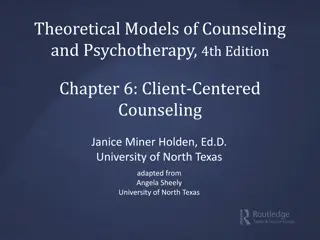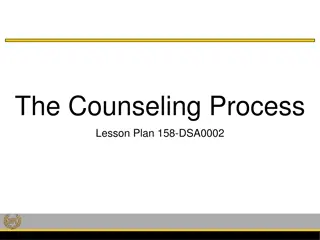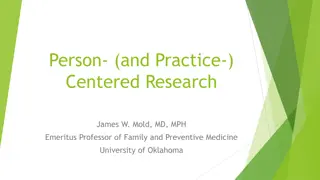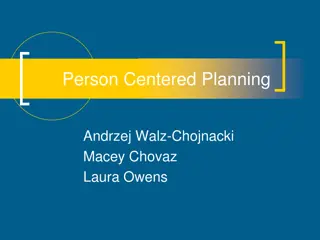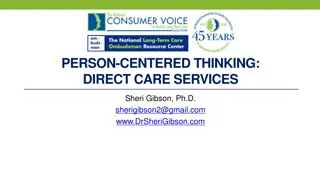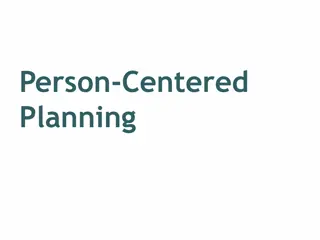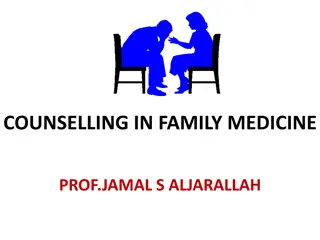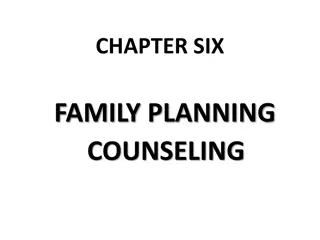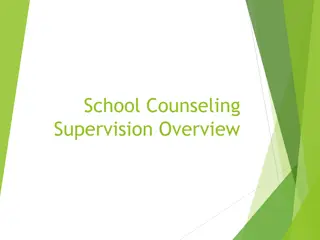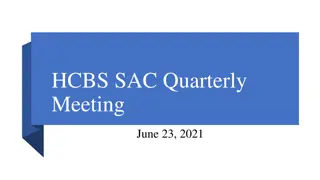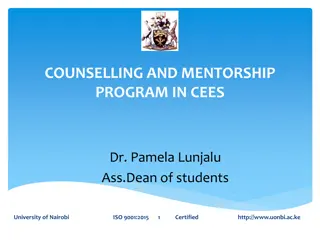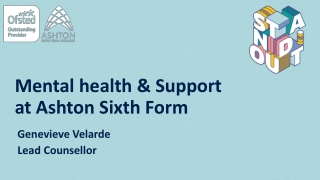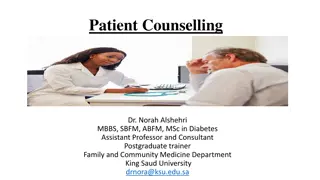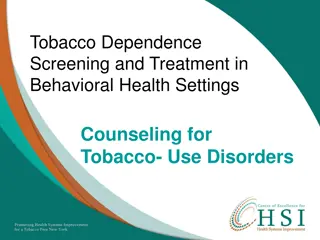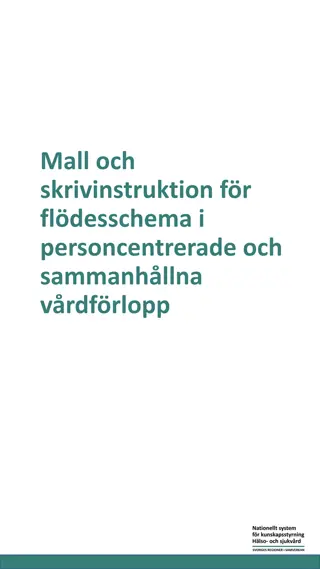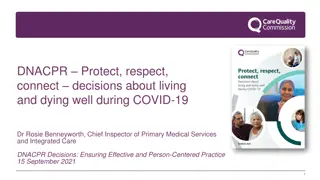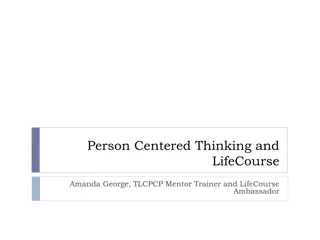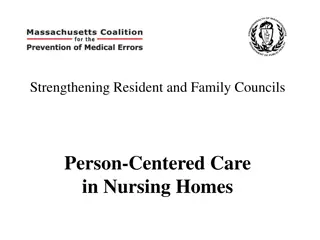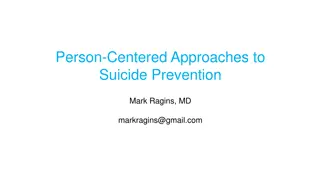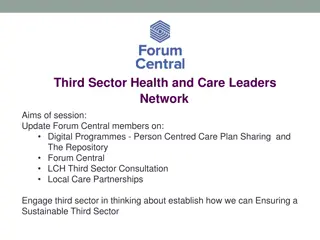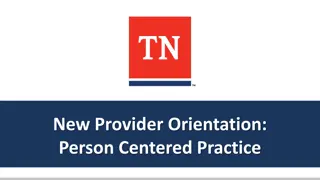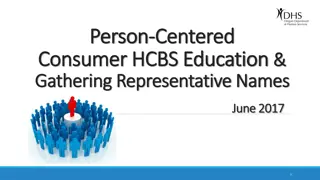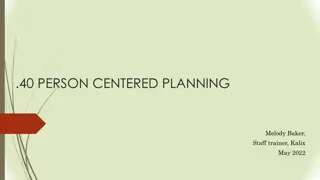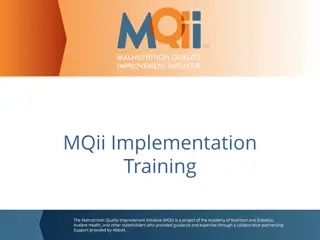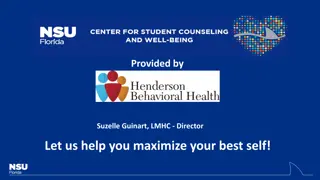Person-Centered Counseling: A Historical and Philosophical Overview
Person-Centered Counseling, pioneered by Carl Rogers, is grounded in humanistic principles such as actualizing tendency, awareness, and existential concepts. This approach emphasizes the innate potential for growth and self-actualization within individuals, focusing on creating a supportive and nonjudgmental environment for clients to explore their feelings and experiences. Rogers' theories on personality development highlight the significance of congruence between one's experiences and self-concept. The interplay between human nature and environmental influences, particularly in the form of positive regard, plays a crucial role in shaping individuals' perceptions of self-worth and identity.
- Person-Centered Counseling
- Carl Rogers
- Humanistic Approach
- Personality Development
- Counseling Theories
Download Presentation

Please find below an Image/Link to download the presentation.
The content on the website is provided AS IS for your information and personal use only. It may not be sold, licensed, or shared on other websites without obtaining consent from the author. Download presentation by click this link. If you encounter any issues during the download, it is possible that the publisher has removed the file from their server.
E N D
Presentation Transcript
Theoretical Models of Counseling and Psychotherapy, 3rd Edition Chapter 6: Person-Centered Counseling Janice Miner Holden, Ed.D. University of North Texas adapted from Angela Sheely University of North Texas
Historical Overview: Carl Rogers Born in 1902 in Oak Park, IL Early education at Union Theological Seminary planted seeds of theory Development of theory in three phases: Nondirective phase Client-centered phase Person-centered phase Awarded first Distinguished Scientific Contribution Award by APA Died in 1987
Philosophical Underpinnings Phenomenology Creativity Actualizing tendency Existential: Alienation Anxiety Authenticity Choice/responsibility Awareness of experience in the present moment
Personality Development Nature of Humans Function of the psyche Actualizing tendency Organismic experience Organismic valuing process Self-observation/awareness
Personality Development Nature of Humans Structure of the psyche: Organismic experience Self-concept
Personality Development Nature of Humans Congruence between organismic experience and self-concept during infancy Organismic experience Self-concept Congruence
Personality Development Role of Environment Positive regard continuum: ----------------------------------------------------- Completely unconditional Completely conditional
Personality Development Interaction of Human Nature & Environment Develop need for positive regard Perceive conditional positive regard from significant others Develop inner conditions of worth: To be worthwhile, I must be X. Exaggerations Part of one s self-concept Deny to awareness experiences that contradict conditions of worth.
Personality Development Interaction of Human Nature & Environment Development of incongruence Organismic experience Self-concept
Personality Development Interaction of Human Nature & Environment Development of incongruence Organismic experience Self-concept Incongruence
Personality Development Interaction of Human Nature & Environment Unhealthy functioning: Incongruence We are all incongruent, to some degree. Deny our inner wisdom to our awareness Use rigid, unexamined values when encountering situations Feel anxiety as organismic experience is subceived Feel confusion as organismic experience sporadically breaks into awareness
Personality Development Interaction of Human Nature & Environment Healthy functioning: Fully functioning person Relatively greater degree of congruence Rely on organismic valuing process (internal, not external locus of evaluation) Open to experience all feelings Self-concept characterized by positive self-regard Values are fluid, changing as each new experience is assimilated
Personality Change Basic Principles Under certain conditions, a person can regain relative congruence and, thus, become more fully functioning: First, I allow more of my actual inner experience (o.e.) into my awareness and my sense of who I am (s-c). Then, I accept that who I am (s-c) is good enough/ worthwhile and, therefore, who I should be. Organismic experience Self-concept
Personality Change Basic Principles Under certain conditions, a person can regain relative congruence and, thus, become more fully functioning: First, I allow more of my actual inner experience (o.e.) into my awareness and my sense of who I am (s-c). Then, I accept that who I am (s-c) is good enough/ worthwhile and, therefore, who I should be (i.s.) Organismic experience Self-concept
Personality Change Client s Role Three of the six necessary and sufficient conditions for constructive client change 1. Client and counselor in psychological contact (client s part) 2. Client in state of relative incongruence 6. Client able to perceive 3, 4, and 5 the core conditions from counselor
Personality Change Counselor s Role Five of the six necessary and sufficient conditions for constructive client change 1. Client and counselor in psychological contact (counselor s part) 3. Counselor genuineness (relative congruence in relationship with client) 4. Counselor s unconditional positive regard for client. 5. Counselor empathywith client s subjective experience senses client s inner world as if being the client but without ever losing the as if condition 6. Counselor success in conveying 3, 4, and 5 the core conditions to client
Personality Change Counselor s Role Counseling techniques activities: Trackclient s unfolding inner experience through Reflection of feeling Directly expressed Implied Reflection of meaning Reflection of intention/motive Reflection of discrepancy Disclosure of relevant inner experience Open-ended question (rarely) Understanding of, and response to, two types of resistance
Contributions and Limitations Interface with recent developments Nature/nurture question DSM 5 Diagnosis Pharmacotherapy Managed care and brief therapy Technical Eclecticism Diversity issues Spirituality Effectiveness of psychotherapy
Limitations and Contributions Limitations Some cross-cultural difficulties in applying concepts Are the necessary and sufficient condition really necessary and/or sufficient for change? Contributions Pioneered a nondirective approach to counseling Pushed Humanistic approach into mainstream psychology/counseling
References Fall, K. A., Holden, J. M., & Marquis, A. (2016). Theoretical models of counseling and psychotherapy (3rd ed.). New York, NY: Routledge. Kirschenbaum, H., & Henderson, V. L. (Eds.). (1989). The Carl Rogers reader. Boston, MA: Houghton Mifflin. Raskin, N. J., & Rogers, C. R. (2005). Person-centered therapy. In R. J. Corsini & D. Wedding (Eds.), Current psychotherapies (7th ed; pp. 130-165). Belmont, CA: Brooks/Cole. Rogers, C. R. (1980). A way of being. Boston, MA: Houghton Mifflin.


